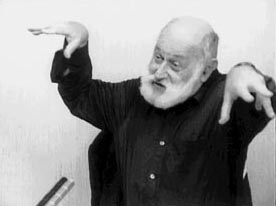Karina/flusser: Difference between revisions
No edit summary |
No edit summary |
||
| Line 1: | Line 1: | ||
===FLUSSER (1988)=== | ===FLUSSER (1988)=== | ||
<br> | <br> | ||
[[File:11210_2.gif.jpeg | 350px]] | |||
[[File:11210_2.gif.jpeg | 350px]] | |||
[[File:11210_2.gif.jpeg | 350px]] | |||
<br> | <br> | ||
Latest revision as of 18:40, 17 November 2016
FLUSSER (1988)
https://www.youtube.com/watch?v=lyfOcAAcoH8
Vilém Flusser is interviewed at the European Media Art Festival in 1988. He expresses his thoughts about the present cultural revolution, the way it developed and its fundamental structures.
He starts with explaining how unnoticeably language is no longer able to express our thoughts and concepts. To fulfil that, codes of technical images are being made. In order to understand the world, it is not enough to describe it using langue, but rather to calculate it with an ideographic code - code of numbers. This manner of turning numbers into images of thoughts has been developed by computers. They transcode numbers into digital codes, which are transcoded into synthetic images. Flusser believes that as synthetic images communicate better than words, it created a revolution, yet unfortunately it isn’t evident as people don’t know how to use this apparatus.
Before the alphabet was invented roughly 3500 year ago, traditional images were used for communication. Their structure had a mythical way of thinking. He refers to this era as pre-historic. The next era he refers to is historical, as once the alphabet was created, it allowed for historical and critical thought. It had a linear way of thinking because the structure of writing was uni-dimensional. This linear way developed as calculus and code started substituting language. This allowed for the now current post-historical era. Flusser calls this new way of thinking as systemic or structural.

